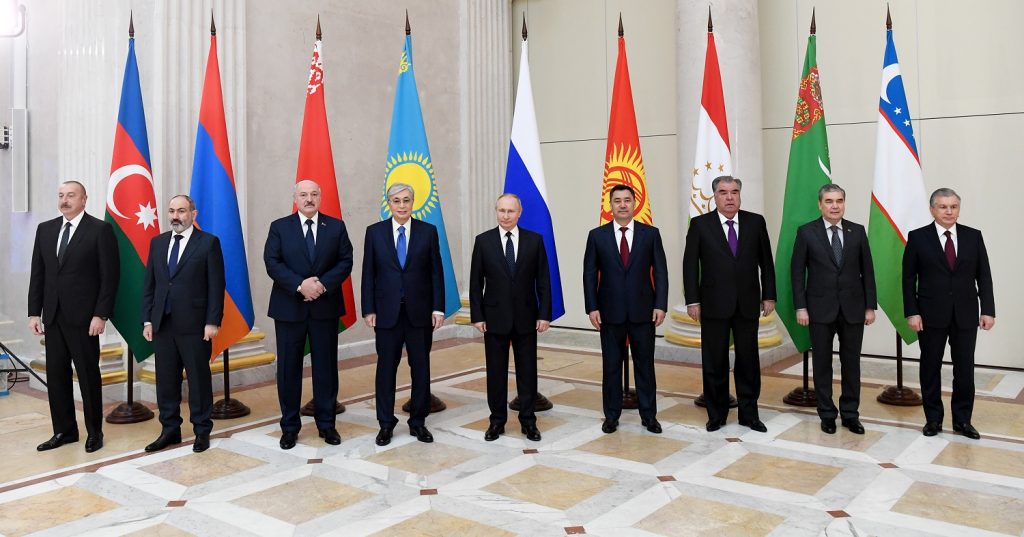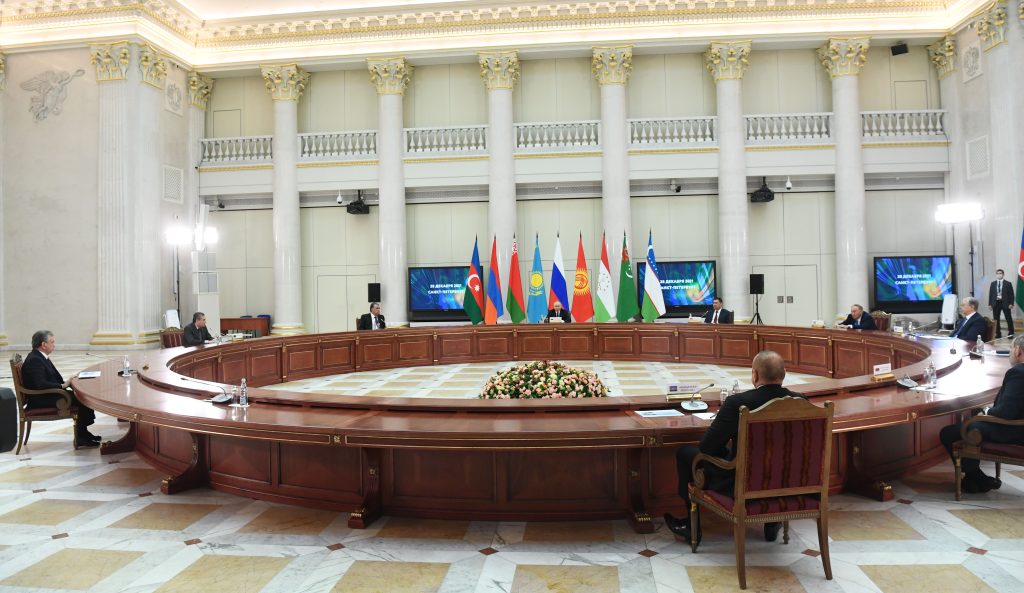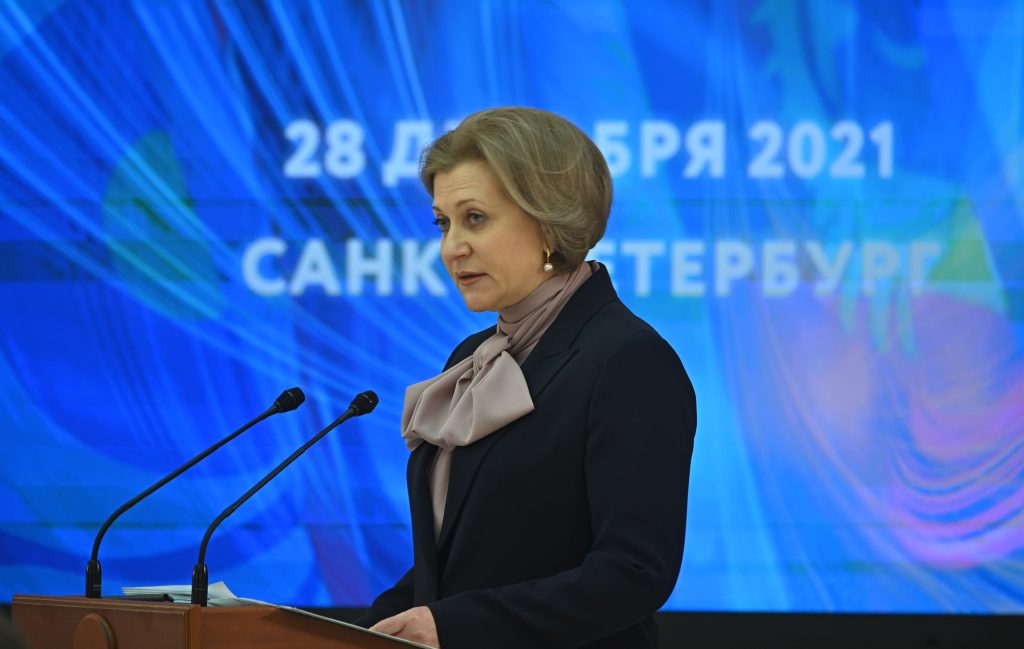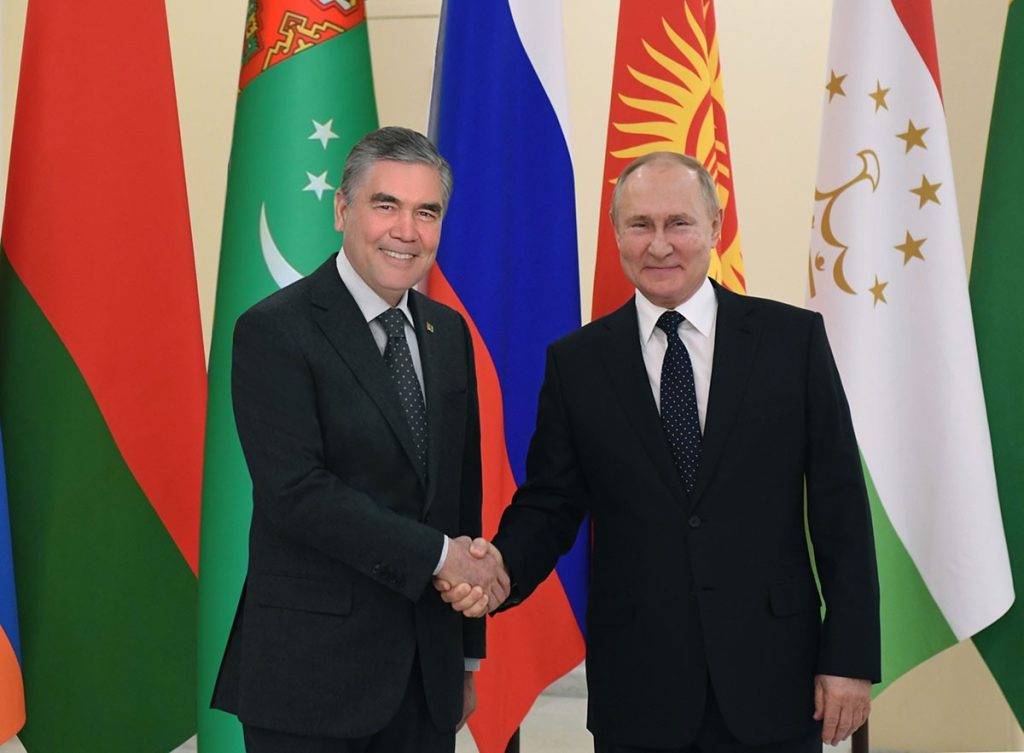Elvira Kadyrova
On 28 December 2021, an informal summit of the CIS Heads of State took place in St. Petersburg.
The traditional end-of-year gathering was attended by:
- First President of Kazakhstan – Elbasy Nursultan Nazarbayev
- President Ilham Aliyev of Azerbaijan
- Prime Minister Nikol Pashinyan of Armenia
- President Alexander Lukashenko of Belarus
- President Sadyr Zhaparov of Kyrgyzstan
- President Vladimir Putin of Russia
- President Emomali Rahmon of Tajikistan
- President Gurbanguly Berdimuhamedov of Turkmenistan
- President Shavkat Mirziyoyev of Uzbekistan
The leaders reviewed the outcomes of cooperation in 2021, discussed future plans, and considered measures to increase mutual trade.
The summit discussed the joint measures to prevent the further spread of the pandemic, specific steps of cooperation between the CIS countries in this area, as well as the possibility of regular exchange of experience between the medical communities of the countries in the prevention and control of coronavirus infection.
Welcoming the participants of the summit, President Vladimir Putin noted that the ties that have been preserved between the CIS countries since the Soviet Union have played a positive role. These are common infrastructure facilities, common businesses that work as partners, chains of creating added value with a high level of cooperation – all this has been preserved and, moreover, developed on an entirely new foundation, a completely new base.
“This allows us to get through the hard times of the pandemic. All countries in the world have faced it, and this has serious economic and social consequences. However, preserving the opportunities and competitive advantages that we have inherited from the past, we are able to overcome these difficulties much better than many other countries,” Putin stressed, stating that Russia has maintained and intends to support these relations in the future.
Russia proposes to jointly strengthen biological security in the CIS
The pandemic, overcoming its consequences and epidemiological safety became one of the topical issues of the summit.
Dr.Anna Popova, head of the Federal Service for Surveillance on Consumer Rights Protection and Human Well-being, Chief State Sanitary Doctor of the Russian Federation (Rospotrebnadzor), was also invited to the summit.
“Epidemiological stability and biological safety in the CIS countries is undoubtedly a condition for the region’s sustainable social and economic development. Considering the proximity of our states, the commonality of epidemic threats and the level of integration, one of our key tasks is to build a unified system for epidemic response and relief”, Popova said.
Why is it so vital for the CIS countries to jointly ensure biological safety in their home space?
Today, biotechnological tools for modifying and creating viruses and bacteria are dangerously accessible, raising the stakes for biosafety.
The Chief Sanitary Doctor of Russia gave two simple examples. In 2016, Canadian virologist [David] Evans revived the extinct equine pox virus from components he purchased online and using some available equipment. Similarly, it is possible to bring back to life the human smallpox virus, which was completely eradicated in 1980.
This year, molecular biologists in the UK have created Syn61 bacterium, which is a bacteriophage-proof variant of Escherichia coli. Bacteriophages are viruses that infect bacteria and can be used to treat such diseases.
That is, there are now a plethora of options for creating biosecurity threats that are difficult to distinguish from natural ones.
Popova also pointed out external threats of a political nature: “At the global level, against the background of the pandemic, destructive forces are attempting to fundamentally reform the international healthcare architecture. The goal is to create tools to influence the policy in the field of biosafety, to enable international structures the right to investigate outbreaks of infections on the territory of countries, to introduce mandatory external checks of potential in the field of biotechnology. [The answer to] this requires a consolidated position of the CIS members on the platform of the World Health Organization and the BTWC.”
How can threats to biological security in the CIS be countered? The head of Rospotrebnadzor proposed the following:
First, to build a unified regional system of measures aimed at the development of scientific research, mutual assistance and exchange of technologies, development results.
Second, to ensure technological and research independence, to create their own facilities and laboratories on their own.
Third, to strengthen unified mechanisms for preventing and responding to biosafety risks, including intentional ones.
No pandemic in Turkmenistan, thanks to the Russian vaccine
“Of course, we are very grateful to the Russian Federation. For example, this pandemic has not been registered in Turkmenistan today, and I would like to say that it is thanks to the Russian Federation,” President Berdimuhamedov stressed following Anna Popova’s remarks.
The Turkmen leader recalled that Turkmenistan was one of the first to register both Russian vaccines – Sputnik V and EpiVacCorona.
“Just a few days ago, Turkmenistan received a batch of Sputnik Light vaccine, which is already being used as a booster vaccination,” President Berdimuhamedov said.
Commenting on the topic of threats to biological security in the CIS, the head of state spoke in favor of reviewing and signing the relevant single document on this issue.
The President of Turkmenistan also drew attention to the importance of studying the genome of the virus. “Methodically, we all need help. If Russia centrally gave us its methodological instructions and manuals, namely on the study of both bacteriology and virology. And we could be united on these issues,” he stressed.
TDH report on participation of President Berdimuhamedov in informal CIS Summit [abridged version]
Today [28 Dec], President of Turkmenistan Gurbanguly Berdimuhamedov left for a working visit to the Russian Federation, where he took part in the informal Summit of the leaders of the CIS countries, held in St. Petersburg in person.
He was warmly and cordially greeted by the President of the Russian Federation Vladimir Putin.
Opening the informal Summit, President of the Russian Federation Vladimir Putin thanked everyone for accepting the invitation and, taking this opportunity, congratulated the heads of friendly states on the 30th anniversary of the creation of the CIS and the 30th anniversary of the independence of the countries of the Organization.
As the Russian leader noted, the very creation of the Commonwealth was undoubtedly justified, integration in many areas deepened in various aspects: both in the sphere of ensuring the security of our states and in the economic sphere. In his opinion, it is the established connections that make it possible to pass through the difficult time of the pandemic, which all countries of the world are faced with.
Considering that the general fight against coronavirus is one of the important and topical topics of discussion, the head of the Federal Service for Supervision of Consumer Rights Protection and Human Welfare (Rospotrebsoyuz), Chief State Sanitary Doctor of the Russian Federation Anna Popova was invited to the high-level meeting, who told on possible further areas of joint work in order to counter a dangerous viral infection.
In this regard, speaking at the Summit, President Gurbanguly Berdimuhamedov thanked President Vladimir Putin for his assistance in this area.
– To date, this pandemic has not been registered in Turkmenistan. Thanks to the Russian Federation, we were one of the first to register Sputnik V and EpiVacCorona with which our population is currently vaccinated. Just the other day, we received Sputnik Light, which is already being marketed as a booster vaccine,” the Turkmen leader noted.
The head of Turkmenistan also came up with a number of initiatives, proposing new areas of cooperation in the field of scientific medicine. In particular, speaking about the threats to biological security in the CIS space, President Gurbanguly Berdimuhamedov proposed once again to revise and sign a single document in this area, noting that Turkmenistan and the Russian Federation have already signed such a document.
In addition, focusing the attention of the meeting participants on the fact that Kyrgyzstan, Kazakhstan, Uzbekistan, Turkmenistan and Tajikistan are arid zones with different clinical manifestations than in Russia, the leader of the nation emphasized the need to study the coronavirus genome, based on the characteristics of this zone.
Thanking for the assistance provided to everyone, President Gurbanguly Berdimuhamedov emphasized that if Russia centralized its methodological instructions and manuals specifically for the study of both bacteriology and virology, then unified approaches would be developed in these issues .
Thanking his Turkmen counterpart for constructive proposals for further cooperation, Russian President Vladimir Putin expressed confidence that the CIS countries would move further in this direction.
It should be noted that holding informal meetings of the leaders of the CIS countries on New Year’s Eve has become a good tradition. At these summits, not only are the results of the work done over the year being summed up, but also the main tasks and priorities of joint activities for the foreseeable future are discussed, positions on major international and regional issues are compared.
Having identified cooperation within the Commonwealth as one of the priority vectors of its foreign policy, neutral Turkmenistan is building its relations with the CIS states on the basis of the historically established traditions of friendship and good-neighborliness.
Considering the Commonwealth of Independent States as an effective platform for an open, constructive dialogue and mutually beneficial long-term partnership, our country invariably takes a proactive position in the implementation of the existing multifaceted potential of the Organization.
Suffice it to recall that it was President Gurbanguly Berdimuhamedov who at one time initiated the idea of strengthening the economic component of interaction between the CIS countries, putting forward an initiative to prepare a Declaration on Strategic Economic Cooperation of the Commonwealth Member States.
This multilateral conceptual document, adopted as a result of the CIS Summit held in Ashgabat in October 2019, once again confirmed the mutual desire of the Organization’s member states to unite efforts to maximize the existing economic potential, to further expand production, cooperation and trade ties.
It is on the key principles of the aforementioned Declaration that the Strategy for the Economic Development of the CIS until 2030 is based, where transport, the fuel and energy complex, communications and communications, industrial cooperation, trade, innovation and technology are identified as priority vectors of interaction.
As the Turkmen leader emphasized at the online meeting of the Council of Heads of State of the Commonwealth of Independent States held on October 15 this year, “these are the sectors in which we can successfully compete in international markets, offer potential partners favorable conditions.”
Noting the importance of promoting the economic interests of the Commonwealth beyond its geographical limits, integrating it into joint projects of neighboring countries and neighboring regions, the head of Turkmenistan focused on the fact that, first of all, this concerns the creation of transport and transit infrastructure, optimization and expansion of energy supplies, the laying of new communication lines and communications. The decisive factor for successful cooperation in the above-mentioned areas is the active participation of the Commonwealth countries in the formation of sustainable transport and transit corridors in the North-South and East-West directions.
In other words, the Commonwealth of Independent States, due to its geopolitical and geo-economic positions, should play a more proactive role on the continent, be an active participant in the development and expansion of trade and economic partnerships between East and West, Asia and Europe.
The CIS countries firmly uphold the principles of equality and respect in interstate relations, advocate the establishment of a culture of peace and dialogue in the global agenda, strengthening of overall stability and security, making a significant contribution to the implementation of the outlined Sustainable Development Goals.
In this regard, among the most important areas for further joint work, Turkmenistan also singles out the protection of the existing architecture of global security, upholding the norms of international law and the UN Charter.
The leader of the nation invariably emphasizes that the CIS countries, using their political and diplomatic capabilities, are called upon to act from a consolidated and principled position in the United Nations, other authoritative international and regional structures, in order to return respect for law, a culture of dialogue, trust and predictability to world politics. in relations between states.
It is this position that provides the Commonwealth of Independent States with vitality and flexibility, reveals new facets and prospects for partnership, determines the existence of the CIS as an integral element of the system of international stability and security.
As noted above, in view of the current conditions, one of the topical areas of joint activities of the Commonwealth countries is countering the coronavirus pandemic and minimizing its socio-economic consequences. In this context, President Gurbanguly Berdimuhamedov has repeatedly stressed the need to establish more effective cooperation mechanisms between the CIS states through scientific medical diplomacy to develop common approaches and methods.
New initiatives put forward by the Turkmen side at the 76th session of the UN General Assembly acquire a special meaning in this regard. Their main content is the creation of new multilateral mechanisms aimed at studying the nature of the origin of a new type of coronavirus, studying the forms of manifestation of the diseases they cause, developing and introducing new forms of treatment and prevention of infectious diseases.
Speaking about giving powerful impetus to the activities of the CIS, the head of Turkmenistan invariably emphasizes that today we need new, modern schemes and models of cooperation both within the Commonwealth and in relations with other states and international economic associations.
Noting the commonality of the goals and objectives, the participants of the current informal high-level meeting reaffirmed the readiness of the neighboring countries to give the traditional partnership a new quality and content, taking into account the accumulated positive experience of joint work and the priorities of socio-economic development.
Also today, within the framework of the visit, President of Turkmenistan Gurbanguly Berdimuhamedov held a telephone conversation with Chairman of the Federation Council of the Federal Assembly of the Russian Federation Valentina Matvienko, during which special attention was paid to the further development of bilateral inter-parliamentary interaction.
… Upon completion of the program of his working visit to the Russian Federation, the President of Turkmenistan went to the Pulkovo International Airport, from where he flew home. /// nCa, 29 December 2021 (pictures credit Kremlin.ru, TDH)



